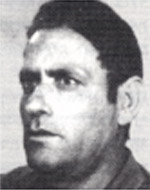Son of Henriette and Fergie, was born on January 13, 1936, in Tunisia. In 1941, Meir began his studies in an elementary school in his city, where he studied for eight years. Afterward, he continued to study for three years in high school. In 1952, Meir stopped studying and went to work as a car electrician. In October 1956, Meir immigrated to Israel alone and lived with his sister’s family in Ofakim, in the Negev, where he worked for one year in field work at the Jewish National Fund. Meir underwent basic training and was assigned as an electrician in his unit. He was promoted to the rank of corporal, and in May 1960 he completed his regular service and volunteered for the career army. In August 1962, Meir was sent to the course of the Six-Day War in the Armored Corps, where he was sent to the course of transport transport, completed an officer’s course, and in September 1968 was promoted to lieutenant. As an outstanding junior officer, Meir was sent in July 1970 with a group of officers of his rank to study in European countries: England, Holland, France, Belgium and Italy. When he returned to Israel he was promoted to the rank of captain, fought in the Yom Kippur War and after the war was stationed as a camp commander in the Armored Corps. The opinion of his commanders was: “He is the commander of an excellent camp, an honest officer, who invests his soul in work.” After a while, Meir was appointed commander of a brigade brigade. “As a brigade commander, he is exceptionally devoted to the unit, devotes his time and energy to raising the achievements of the brigade, has a special leadership ability and his people follow him everywhere.” In September 1973 Meir was promoted to the rank of Major. Meir completed his high school education in 1976. He was appointed deputy commander of the intelligence training unit, and was described as “a very energetic and responsible officer, with excellent organizational ability, fighting for his principles, very decent, with exemplary leadership, courageous, “He said. He continued to fill senior positions in the Armored Corps, and his commanders recommended his promotion: “He is an extremely efficient and dedicated officer, takes care of his soldiers, gives a personal example, straight and loyal.” In July 1978, Meir was promoted to lieutenant colonel. Meir retired from the IDF in February 1983. Shortly before his departure from active service, his commanders recommended that he be appointed director of the Latrun Project, a memorial site in Latrun for the fallen soldiers of the Armored Corps on May 29, 1982. He was 46 years old when he died. He was laid to rest at the military cemetery in Rehovot, the city where he lived. He left behind a wife, son, daughter, mother, two sisters and two brothers. In December 1992, his son, Sergeant Udi-Yehuda, fell in battle with terrorists in Gaza and was buried in the military section where his father was buried. “During his 24 years of service in the IDF, Lt. Col. Meir Zamir dedicated himself to the service of the nation and the state in the Armored Corps, where he spent nights and days setting work patterns that made him a symbol and an asset to the IDF and the Armored Corps. I had the privilege of being his commander in the facility that was established and nurtured for his work, energy and devotion, which turned him into an inalienable asset in the Armored Corps. He was devoted, loyal, a devoted friend and a true friend who helped and advised in every field. In his death, the Jewish people lost one of its chosen sons, and the IDF lost one of its most senior officers. “
